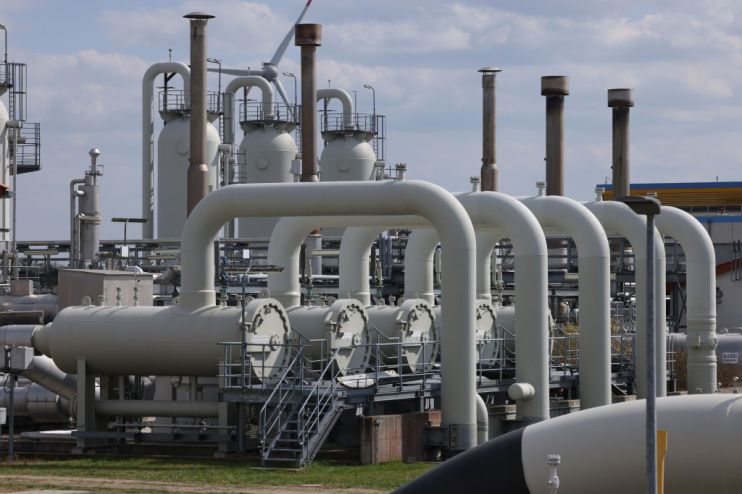No pressure? Gazprom cuts gas flows into Europe as cold winter months loom

Gazprom plans to further cut gas flows into Europe, raising the chilling prospect of rationing and blackouts across the troubled Continent this winter.
The Kremlin-backed gas giant warned yesterday it was shutting down a gas turbine engine on the key Nord Stream 1 pipeline to Germany, and that flows would drop to 20 per cent of normal capacity.
Flows were already at just 40 per cent of normal levels – putting intense pressure on European countries scrambling for supplies to meet household energy needs this winter.
The new supply blow comes amid high tensions between the West and the Kremlin following Russia’s brutal invasion of Ukraine.
The EU has accused Russia of energy blackmail, while the Kremlin has argued gas disruption has been caused by maintenance issues and Western sanctions.
The energy giant argued Western restrictions prevented the company from making urgent repairs to turbine engines, while documentation provided for a Siemens turbine shipped from Canada was not satisfactory.
European governments however, have challenged this claim, with Germany saying the turbine was not even needed until September.
Russia recently retaliated to EU plans to ban seaborne oil shipments and coal imports, cutting off supplies to 12 EU member states which refused to purchase Gazprom supplies in roubles.
Crisis escalates German recession fears
Moscow’s latest move likely nails on Germany, Europe’s economic powerhouse, tumbling into a recession soon.
The Continent’s largest economy is already stuttering amid surging inflation and months of weaker Russian gas flows, a survey published yesterday revealed.
Confidence among German businesses dropped to 88.6 this month, down from just over 92 in June and far below analysts’ expectations, the IFO Institute said.
“Germany is on the cusp of a recession,” the IFO Institute said, adding “companies are expecting business to become much more difficult in the coming months”.
Robin Brooks, chief economist at the Institute of International Finance, noted “the forward-looking expectations component in the German IFO survey is almost as bad as [the financial crisis in] 2008”.
Germany’s industrial sector heavily relies on Russian gas to generate output, meaning reduced supplies will curb activity and weigh on the whole economy.
Industrial firms contribute a large chunk to the country’s gross domestic product.
Last week, the country’s government was forced to bail out Uniper to the tune of €15bn, its biggest company importing gas from Russia amid supply shocks.
Continent scrambles to secure supplies ahead of winter
Germany triggered the second stage of its three-phase emergency gas plan in June – with the latest blow raising the chances it will trigger the final stage.
This could lead to the country’s government confiscating and redistributing gas supplies to stave off blackouts this winter.
President Vladimir Putin warned the West this month that continued sanctions risked triggering catastrophic energy price rises for consumers around the world.
Foreshadowing the latest cuts, he said: “There are two functioning machines there, they pump 60m cubic metres per day … If one is not returned, there will be one, which is 30 million cubic metres.”
The EU is racing to secure supplies ahead of winter – with the bloc pushing for storage to be topped-up to 80 per cent this September.

The International Energy Agency has warned supplies need to reach at least 90 per cent to ensure consumer dmeand can be met if Russia halts flows entirely.
Currently, storage levels are at 66 per cent, reflecting the daunting task ahead.
Craig Erlam, senior market analyst at OANDA, told City A.M. the latest manoeuvre from Gazprom highlighted the folly of Europe’s reliance on Russian gas.
He said: “Europe must end the energy relationship as soon as possible or forever be vulnerable to the ambition and aggression of the Kremlin. It will still take time to replace Russian gas because of the infrastructure that will be required but the desire to do so will not be lessened by Gazprom turning the taps back on. Europe remains vulnerable going into the winter as its reserves are well below where they need to be. If Europe wants to avoid an anxious six months, it should at least push for households and businesses to avoid waste and save where possible.”
Fears of supply shortages caused European gas prices to spike a whopping 12 per cent following the news, with UK benchmarks also up two per cent from already historically elevated levels.